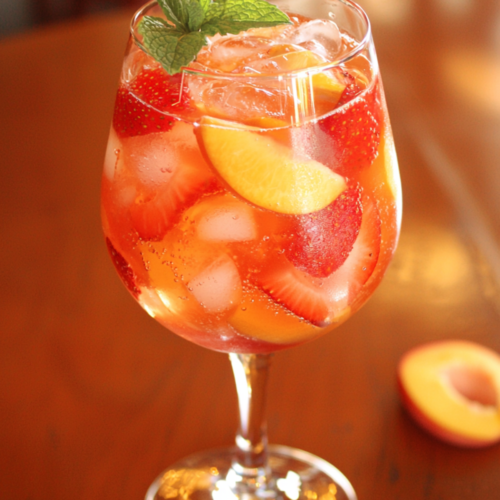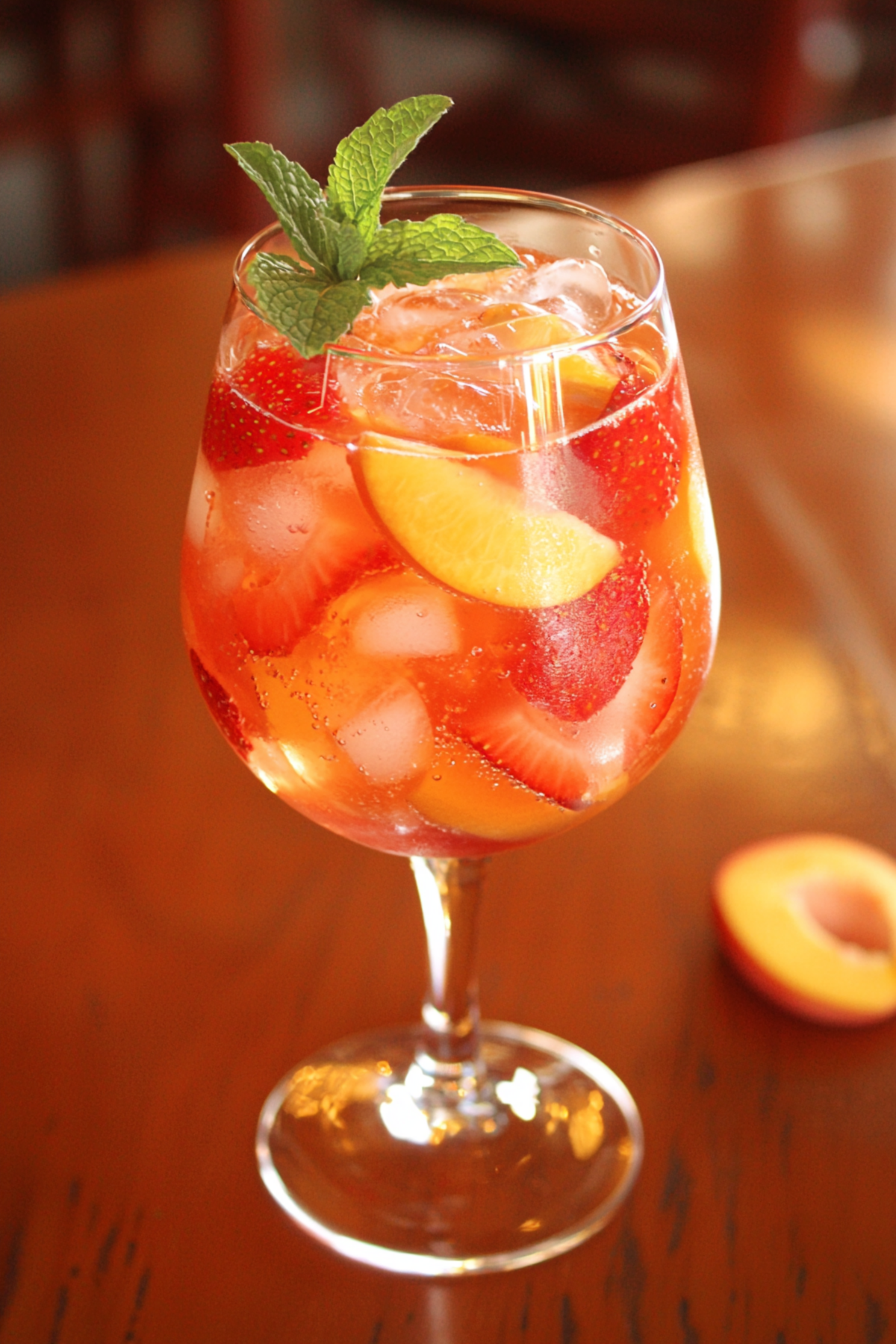Rosé Sangria
Introduction
Rosé Sangria is a delightful twist on the traditional sangria. This refreshing drink combines the crispness of rosé wine with a medley of vibrant fruits. Perfect for summer gatherings, it’s a crowd-pleaser that brings a splash of color and flavor to any occasion.
The primary flavors of Rosé Sangria come from the fruity notes of the wine, complemented by fresh fruits like strawberries and peaches. A hint of brandy adds depth, making it a sophisticated choice for warm afternoons.
Whether you’re hosting a barbecue or enjoying a picnic, Rosé Sangria is the ideal companion. Its light and fruity profile appeals to both casual drinkers and wine enthusiasts alike.
Key Facts About the Rosé Sangria
– Approximate Alcohol Volume: 10% ABV
– Calories: Approximately 150 calories per serving
– Preferred Glass Type: Large wine glass or pitcher
– Typical Garnish: Fresh mint leaves
Interesting Facts about the Rosé Sangria
– Rosé Sangria is often enjoyed chilled, enhancing its refreshing qualities.
– The drink can be customized with seasonal fruits, making it versatile year-round.

Tasting Notes
The flavor profile of Rosé Sangria is a delightful balance of sweetness and acidity. The rosé wine provides a light, fruity base, while the fresh fruits add layers of flavor. Each sip is a burst of summer, making it incredibly refreshing.
This cocktail appeals to those who enjoy fruity drinks without overwhelming sweetness. It’s perfect for outdoor gatherings, brunches, or simply relaxing on a sunny day.
The addition of soda water or lemon-lime soda gives it a fizzy finish, enhancing the overall experience. It’s a drink that invites conversation and laughter.
History of the Rosé Sangria
Sangria has its roots in Spain, where it has been enjoyed for centuries. Traditionally made with red wine, the concept of sangria has evolved over time. The introduction of rosé wine into the mix is a modern twist that has gained popularity.
The name “sangria” comes from the Spanish word “sangre,” meaning blood, referring to the deep red color of traditional sangria. However, the lighter hue of rosé sangria offers a refreshing alternative.
As summer cocktails gained traction, Rosé Sangria emerged as a favorite. Its vibrant colors and fruity flavors make it visually appealing and delicious.
Rosé Sangria Ingredients
– 1 bottle (750 ml) rosé wine: The base of the cocktail, providing fruity notes.
– 1/4 cup (60 ml) brandy: Adds depth and warmth to the drink.
– 1/4 cup (60 ml) orange liqueur: Enhances the citrus flavor profile.
– 2 tablespoons (30 ml) simple syrup: Adjusts sweetness to taste.
– 1 cup (150 g) strawberries: Fresh and juicy, they add a burst of flavor.
– 1 cup (150 g) peaches: Sweet and fragrant, perfect for summer.
– 1 orange: Sliced for a zesty kick.
– 1 lemon: Adds brightness and acidity.
– 1 cup (240 ml) soda water: Provides fizz and lightness.
– Fresh mint leaves: For garnish, adding aroma and color.
– Ice cubes: Keeps the drink chilled.

Rosé Sangria Method
Prepare the Fruits
Start by adding the sliced strawberries, peaches, orange, and lemon to a large pitcher. Gently muddle the fruits with a wooden spoon to release their juices. This step is crucial for infusing the sangria with fruity flavors.
Combine the Liquids
Pour in the rosé wine, brandy, orange liqueur, and simple syrup into the pitcher. Stir gently to mix the ingredients together, ensuring an even distribution of flavors.
Chill
Cover the pitcher and refrigerate for at least 2 hours. This allows the flavors to meld beautifully. For the best results, chill overnight for a more intense flavor.
Serve
When ready to serve, add ice cubes to glasses or directly into the pitcher. Pour the sangria over the ice, filling each glass about three-quarters full.
Top Up
Add soda water or lemon-lime soda to each glass or the pitcher. This adds a refreshing fizz and balances the sweetness.
Garnish
Finish with fresh mint leaves for a touch of color and aroma. This simple garnish elevates the presentation.

Serving Suggestion
For serving, use a large wine glass or a pitcher to showcase the vibrant colors of the sangria. The wide bowl of the glass allows for easy sipping and enhances the aromatic experience.
Garnish each glass with fresh mint leaves. This not only adds visual appeal but also a refreshing aroma that complements the drink.
Elevating the Rosé Sangria
– Use High-Quality Ingredients: Opt for a premium rosé wine and fresh, organic fruits for the best flavor.
– Infuse with Herbs: Experiment with herbs like basil or rosemary for a unique twist.
– Chill Your Ingredients: Ensure all components are chilled before mixing for a refreshing experience.
– Experiment with Flavors: Try adding flavored sparkling water or different liqueurs for variety.
– Presentation Matters: Serve in elegant glassware and consider adding edible flowers for a stunning look.
Substitutions and Alternatives for the Rosé Sangria
If you don’t have rosé wine, consider using white wine for a lighter version. Alternatively, red wine can be used for a more traditional sangria experience.
For a non-alcoholic option, substitute the wine and brandy with sparkling grape juice. This maintains the festive feel without the alcohol.
Similar cocktails include White Sangria and Fruit Punch, both of which share fruity elements and are perfect for gatherings.
Add a Twist
– Spicy Rosé Sangria: Add a slice of jalapeño for a spicy kick.
– Berry Blast: Incorporate mixed berries for a more complex flavor profile.
– Citrus Burst: Use blood oranges and grapefruit for a zesty twist.
Preferred Liquors for the Rosé Sangria
For the best Rosé Sangria, consider using brands like Miraval Rosé or Whispering Angel. These wines offer excellent flavor profiles that complement the fruits.
For brandy, Hennessy or Rémy Martin are great choices. They add depth and richness to the sangria.
Similar Cocktails to the Rosé Sangria
– White Sangria: A lighter version using white wine and similar fruits.
– Hibiscus Sangria: Infused with hibiscus tea for a floral note.
– Peach Bellini: A fruity cocktail made with peach puree and sparkling wine.
Food Pairings to go with the Rosé Sangria
Pair Rosé Sangria with light appetizers like bruschetta or cheese platters. These complement the fruity flavors beautifully.
For a more adventurous pairing, consider spicy shrimp tacos or grilled vegetable skewers. The flavors harmonize well with the sangria’s sweetness.
Rosé Sangria FAQs
1. Can I make Rosé Sangria ahead of time?
Yes, it’s best to prepare it a few hours in advance to allow flavors to meld.
2. What fruits can I use in Rosé Sangria?
You can use any seasonal fruits, such as berries, apples, or citrus.
3. Is Rosé Sangria sweet?
The sweetness can be adjusted with simple syrup, depending on your preference.
4. Can I make a non-alcoholic version?
Absolutely! Substitute wine and brandy with sparkling grape juice.
5. How long does Rosé Sangria last in the fridge?
It’s best consumed within 2-3 days for optimal freshness.

Rosé Sangria
Equipment
- Large pitcher
- Wooden spoon
- Measuring cups and spoons
- Knife and cutting board
- Glasses for serving
Ingredients
- 1 bottle (750 ml) rosé wine approximately 25.4 oz
- 1/4 cup brandy
- 1/4 cup orange liqueur such as Cointreau or Triple Sec
- 2 tablespoons simple syrup adjust to taste
- 1 cup strawberries hulled and sliced
- 1 cup peaches sliced
- 1 orange sliced
- 1 lemon sliced
- 1 cup soda water or lemon-lime soda for sweetness
- Fresh mint leaves
- Ice cubes
Instructions
- In a large pitcher, add the sliced strawberries, peaches, orange, and lemon. Gently muddle the fruits with a wooden spoon to release some of their juices.
- Pour in the rosé wine, brandy, orange liqueur, and simple syrup into the pitcher with the muddled fruits. Stir gently to mix the ingredients together.
- Cover the pitcher and refrigerate for at least 2 hours to allow the flavors to meld. For best results, chill overnight.
- When ready to serve, add ice cubes to glasses or directly into the pitcher. Pour the sangria over the ice, filling each glass about three-quarters full.
- Add the soda water or lemon-lime soda to each glass or the pitcher for a bit of fizz and sweetness.
- Finish with fresh mint leaves for a touch of color and aroma.

